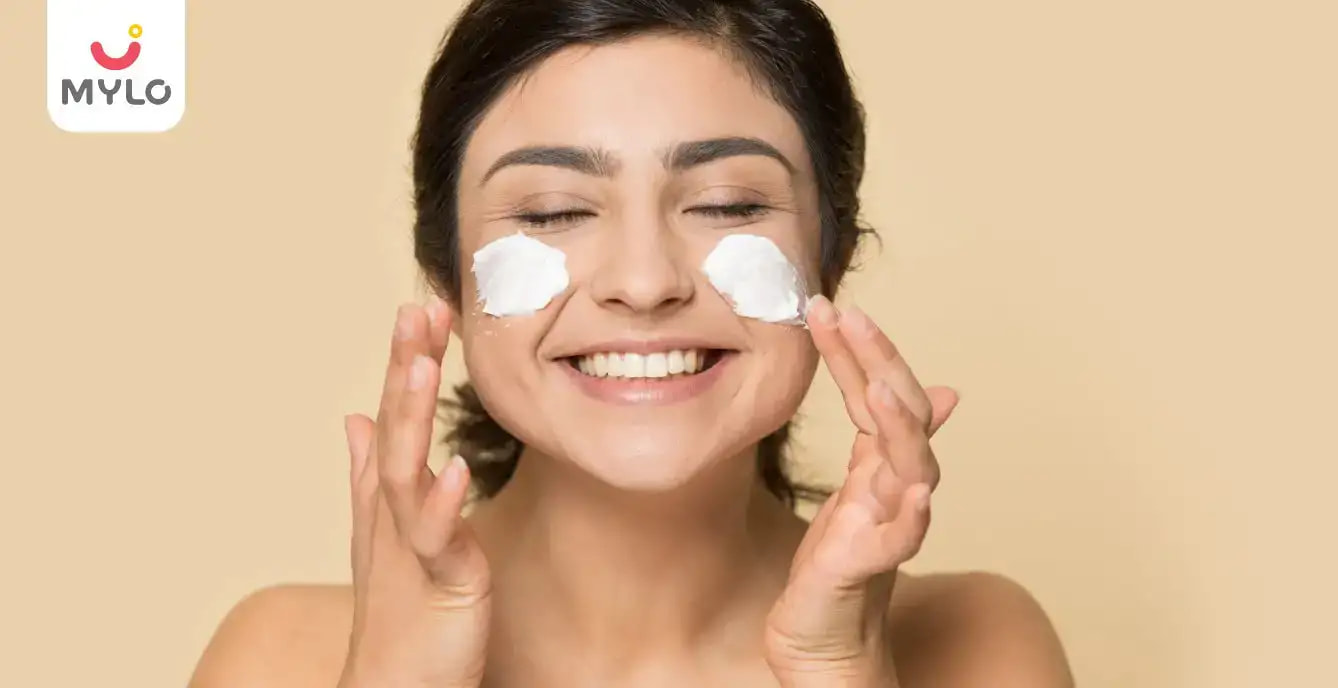Home

Beauty & Skincare

Are Whitening Creams Really Effective on Your Face?
In this Article

Beauty & Skincare
Are Whitening Creams Really Effective on Your Face?
Updated on 3 November 2023
These days everybody needs impeccable and youthful skin. There's been an obsession with fairer skin lately. However, the daily exposure of skin to dirt, residue, contamination, and harmful sun rays makes it look sad and dull. So, in such a case, what do you really do? Do you randomly buy skin whitening creams or do you conduct your due research and see which cream is better? This article will help you understand of your face really needs a whitening cream and how effective it is!
What is Skin Lightening Or Skin Whitening?
We have the same goal regarding our skin, no matter how beautiful a shade of skin we have. The goal is to have a bright skin tone and a healthy glow. Sun exposure, hormones, genes, and many other factors get in the way of our struggles, creating blemishes, dark spots, acne breakouts, and hyperpigmentation. It is hard to keep track of various terms by an individual, from skin brightening to lightening and whitening creams regarding skin care.
The question is, which is the right product for you when trying to achieve an even skin tone? The answer is having a sense of skincare ingredients in the product and their effects. When using the product, understand the terms used by various companies and their meaning.
The technique of skin care products whitening the dark spots caused by hyperpigmentation is inferred as skin whitening. Skin whitening evens the skin tone by concentrating on the areas of the skin that are discolored, like pigmentation and scars, age spots, and acne breakouts. A whitening cream hinders the overproduction of the tyrosinase enzyme responsible for melanin production.
What is Hyperpigmentation?
The darkening of the skin is generally referred to as hyperpigmentation. It mainly occurs in skin areas exposed to sun rays, such as the hands and face. It arises due to the overproduction of melanin, and in the case of sun exposure, it's your body's way of insulating the skin from harmful UV rays.
Hyperpigmentation can look like various things on your skin such as blemishes, sunspots, freckles, blotchiness, and more. While it is mainly due to sun exposure, it could be due to stress, anxiety, and hormonal fluctuations due to pregnancy or menopause. It is usually found in the areas of the hands and skin, but it can also occur in areas of the underarms, thighs, knees, and elbows. Using skin care products such as creams and serums is one way to combat hyperpigmentation.
How Does Skin Whitening Cream Work?
Skin whitening cream generally works by blocking an enzyme in the skin responsible for the production or some induction of melanin, a type of skin pigment that makes your skin appear darker. Everybody's skin is made up of a variety of cells. Melanin is a cell that gives pigment to the skin, hence providing our skin its unique color and tone. Within skin cells, an enzyme called tyrosinase is responsible for the production of melanin.
Skin whitening creams work by inhibiting the production of tyrosinase. Anyone can use skin care products that contain tyrosinase inhibitors. Skin lightening creams also inhibit hyperpigmentation due to hormonal fluctuations, sun exposure, genes, or any other reason arising in the future.
Does Skin Whitening Cream Work?
This is the most common question on every individual's mind who thinks about using skincare products. Although there are multiple answers, it is different among different individuals. A recent study among many individuals has concluded that skin whitening creams barely affect skin tone, and the results are even worse for those using over-the-counter products.
Some studies show that some individuals develop melanoma( brown to grey-brown patches) and post-inflammatory hyperpigmentation. Less than 50% of individuals reported improvement in their skin tone. The answer is simple; it is different for every individual. Hence, it is best to consult a dermatologist before using any skin care product since every individual's skin requirement is additional. Avoid over-the-counter products unless recommended by the dermatologist.
Benefits of Skin Whitening Cream
-
Some skin whitening creams reduce the appearance of dark spots on the skin due to sun exposure, aging, and hormonal fluctuations. It treats conditions such as age spots, freckles, blemishes, and post-inflammatory marks such as eczema and psoriasis.
-
These creams sometimes help in fading scars due to various reasons. Post - acne breakout may help to reduce redness and puffiness, although it does not help if there is active inflammation.
-
Some ingredients in skin whitening cream help delay the aging process. They make your skin look younger and youthful.
-
Skin brightening creams are inexpensive when compared to laser treatment and other types of therapies used in skin treatment.
-
Some skin whitening creams maintain the health of your skin and give you faster results without damaging your skin.
Risks Of Using Skin Whiteners
Some skin whiteners use mercury as one of the ingredients, which has significant risks associated with it. A study revealed that nearly 1 out of every 4 skin whiteners made in Asia and solid outside the USA contained mercury.
The other potential risk associated with skin whiteners can include the following:
-
It can cause premature skin aging if used for a prolonged time.
-
Long-term usage may increase the risk of skin cancer from sun exposure. Along with skin whitener, it is better to use broad-spectrum sunscreen while outside.
-
Steroids used in some skin listeners can increase the risk of skin infections, skin thinning, acne marks, and poor wound healing. If whiteners with steroids are applied to a larger area, they can be absorbed by the body, which can be harmful.
-
It can cause skin irritation, allergic reaction, and allergy if your skin whitener contains a bleaching agent.
-
Some of the whiteners contain hydroquinone which may cause untreatable skin discoloration.
Steps To Use Skin Whitening Products To Get Effective Results
Any skin care product with the correct usage can give the desired result. If you do not use it correctly, you might end up hurting or damaging your skin. However, if you are unaware of using them correctly, the following steps can be helpful.
-
Our skin has dust and dirt all over it because of the surroundings and sun exposure. Therefore, the first thing to do is wash your face thoroughly with either cold or lukewarm water to remove any impurities. This step helps penetrate the cream since the pores have opened up.
-
The second step is to exfoliate your skin. It helps expel any impurities and dead cells on the skin and provides a better result.
-
The third step is to rinse or wash your face with cold or lukewarm water. Avoid rubbing your skin to avoid skin damage.
-
The next step is to dry your skin thoroughly with a soft and dry towel to get better results from the skin whitening cream.
-
Applying the cream gently to the face is the next step. It gives you flawless and youthful skin with an even skin tone through regular use.
Special Precautions When Using A Skin Whitener
-
Some doctors do not recommend using over-the-counter skin whitening products as they can be harmful and ineffective.
-
Some skin whitening products are not recommended for people with darker skin tones since they can cause hyperpigmentation.
-
It is not recommended for pregnant and nursing women and children to use skin whitening treatments.
-
Check the ingredients list over the cream to check for mercury content. It can also be listed as calomel, Mercurio, or mercurous.
-
Suppose the list of ingredients contains hydroquinone but doesn't mention its amount. Do not purchase it. The required amount should not be more than 2% of that chemical.
-
Above all, consult your dermatologist for specific instructions when purchasing a skin whitening cream.
What Are Some Of The Common Ingredients In Skin Whitening Creams?
-
Kojic acid: Kojic acid treats a skin condition called melasma. It is typically made from fermented mushrooms and hinders the overproduction of melanin which is known to cause unevenly pigmented skin. Kojic is renowned worldwide for its skin-whitening abilities. This ingredient is manufactured after the rice is malted for sake. It brightens your skin by inhibiting melanin which is known to darken the skin.
-
Arbutin is a derivative of hydroquinone, a typical skin whitener that leaves your skin glowing. It evens out and brightens skin tone, lightens darkened areas, and helps in the disappearance of scars.
-
Vitamin C: Vitamin C lightens the skin by inhibiting the amount of melanin the skin cells can generate. It typically interacts with tyrosinase, the primary enzyme responsible for producing melanin.
-
Retinol is one of the best skin care ingredients used in skin products. Retinol is derived from vitamin A which is a type of retinoid. It removes dead skin cells. It infiltrates deep into the inner layer of the skin. It reduces the appearance of fine lines, wrinkles, and enlarged pores.
If you have a dry skin type, a whitening cream with the following ingredients can be considered suitable for you:
For dry skin, look for products containing shea butter and lactic acid. They provide hydration and mild exfoliation keeping the skin radiant and youthful. Hyaluronic acid is also used in skin creams as its concentration decreases as age progresses, most significantly after the 40s. Since it can boost skin moisture content, it is recommended for whitening creams for dry skin types.
Ceramides are another ingredient used in skin-brightening creams. It is a type of lipid or fat used to hydrate your skin. These fats are found in the skin's outermost layer, which forms a barrier and protects the moisture content in your skin. It is added in brightening creams to refresh the skin's ceramic levels.
If you have oily or acne acne-prone skin, a whitening cream with the following ingredients can be considered suitable for you:
While oily skin is prone to acne, it can also delay the first signs of aging. Salicylic acid is one of the best ingredients for oily skin. It exfoliates and treats the pore from within, which helps to prevent skin breakouts. It helps in reducing whiteheads and blackheads while calming and soothing the skin.
Glycolic, salicylic, and azelaic acids are also used in brightening creams for oily skin types. Glycolic acid exfoliates and hydrates the skin at the same time. Azelaic acid treats acne and reduces breakouts due to oil secretion.
Dimethicone is also used in skin-whitening creams.
If you have dull or pigmented skin, a whitening cream with the following ingredients can be considered suitable for you:
A combination of glutathione, vitamin C, kojic acid, and liquorice extract can be used to reduce pigmentation. Kojic acid inhibits the production of melanin in the skin, which reduces pigmentation. Glycolic acid, vitamin C, and kojic acid can help to reduce fine lines, irregular pigmentation,
If you are looking for a daily-use cream, a whitening cream with the following ingredients can be considered suitable for you:
Brightening cream mainly contains aloe vera, shea butter, retinol, vitamin C, hyaluronic acid, or glycolic acid. Different ingredients are used in other creams based on skin type. Hyaluronic acid is generally used in day cream, whereas retinol is used in a night cream. Hyaluronic acid is used to reverse aging; it is considered an elixir for youth. At the same time, retinol is a skin-restoring, skin-firming, and wrinkle-smoothing ingredient used in night creams. Retinol is an antioxidant that reduces visible signs of aging.
You may like: https://mylofamily.com/article/benefits-of-using-a-whitening-cream-on-your-face-185166
Conclusion
Skin lightening creams may be used for various conditions, from hyperpigmentation to melanoma. It reduces the appearance of dark spots, freckles, blemishes, acne breakouts, hyperpigmentation, and protection from UV rays. However, it is better to consider the help of a dermatologist before purchasing any skincare products. This ensures the product is safe and appropriate for your skin type. Although they may help in unwanted skin darkening or spots, be logical about how beneficial these products can be in whitening skin tone or decrease the appearance of dark spots.



Written by
khushboo jain
Get baby's diet chart, and growth tips

Related Articles
Related Topics
RECENTLY PUBLISHED ARTICLES
our most recent articles

Diet & Nutrition
গর্ভাবস্থায় আলুবোখরা: উপকারিতা ও ঝুঁকি | Prunes During Pregnancy: Benefits & Risks in Bengali

Diet & Nutrition
গর্ভাবস্থায় হিং | ঝুঁকি, সুবিধা এবং অন্যান্য চিকিৎসা | Hing During Pregnancy | Risks, Benefits & Other Treatments in Bengali

Women Specific Issues
স্তনের উপর সাদা দাগ: লক্ষণ, কারণ এবং চিকিৎসা | White Spots on Nipple: Causes, Symptoms, and Treatments in Bengali

Diet & Nutrition
গর্ভাবস্থায় পোহা: উপকারিতা, ধরণ এবং রেসিপি | Poha During Pregnancy: Benefits, Types & Recipes in Bengali

Diet & Nutrition
গর্ভাবস্থায় মাছ: উপকারিতা এবং ঝুঁকি | Fish In Pregnancy: Benefits and Risks in Bengali

Diet & Nutrition
গর্ভাবস্থায় রেড ওয়াইন: পার্শ্ব প্রতিক্রিয়া এবং নির্দেশিকা | Red Wine During Pregnancy: Side Effects & Guidelines in Bengali
- ইনার থাই চ্যাফিং: কারণ, উপসর্গ এবং চিকিৎসা | Inner Thigh Chafing: Causes, Symptoms & Treatment in Bengali
- গর্ভাবস্থায় ব্রাউন রাইস: উপকারিতা ও সতর্কতা | Brown Rice During Pregnancy: Benefits & Precautions in Bengali
- Velamentous Cord Insertion - Precautions, Results & Safety
- Unlock the Secret to Flawless Skin: 7 Must-Have Qualities in a Face Serum
- Unlock the Secret to Radiant Skin: How Vitamin C Serum Can Transform Your Complexion
- Gender No Bar: 10 Reasons Why Everyone Needs a Body Lotion
- Unlock the Secret to Radiant Skin How to Choose the Perfect Body Lotion for Your Skin Type
- Top 10 Reasons to Apply a Body Lotion After Every Bath
- Communication in Toddlers: Milestones & Activities
- How to Improve Vocabulary for Toddlers?
- A Comprehensive Guide to Understanding Placenta Accreta
- Vulvovaginitis in Toddlers Causes, Symptoms and Treatment
- A Comprehensive Guide to Understanding Cerebral Palsy in Children
- Bitter Taste in Mouth During Pregnancy: Understanding the Causes and Remedies


AWARDS AND RECOGNITION

Mylo wins Forbes D2C Disruptor award

Mylo wins The Economic Times Promising Brands 2022
AS SEEN IN

- Mylo Care: Effective and science-backed personal care and wellness solutions for a joyful you.
- Mylo Baby: Science-backed, gentle and effective personal care & hygiene range for your little one.
- Mylo Community: Trusted and empathetic community of 10mn+ parents and experts.
Product Categories
baby carrier | baby soap | baby wipes | stretch marks cream | baby cream | baby shampoo | baby massage oil | baby hair oil | stretch marks oil | baby body wash | baby powder | baby lotion | diaper rash cream | newborn diapers | teether | baby kajal | baby diapers | cloth diapers |







